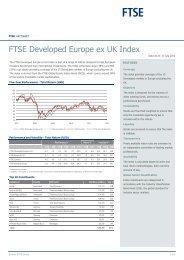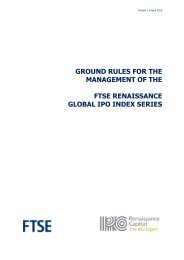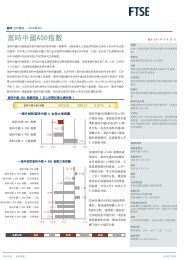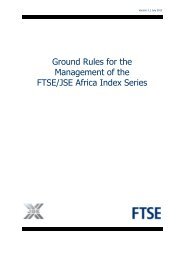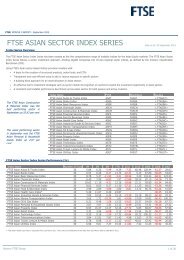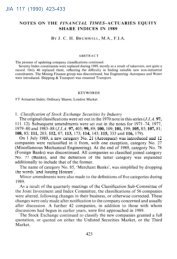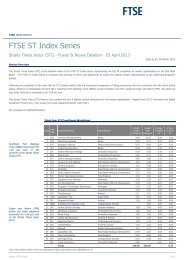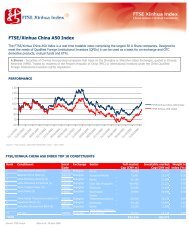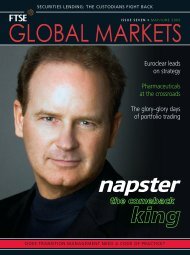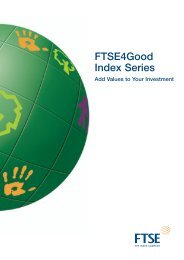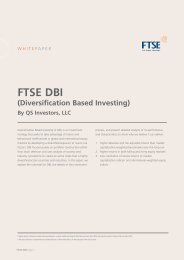Create successful ePaper yourself
Turn your PDF publications into a flip-book with our unique Google optimized e-Paper software.
worsen still further in 2009 as America’s recession, triggered<br />
by the meltdown in sub prime mortgages, deepens and<br />
spreads worldwide. “We are a cyclical company,” Joerres<br />
readily admits. “We understand that. During any economic<br />
downturn, we will see our revenues decrease.” Although<br />
revenues for 2008 are expected to rise by 6.3% to $21.8bn,<br />
earnings will be down sharply. For example, analyst Andrew<br />
Steinerman of JPMorgan, who had once expected 2008<br />
earnings per share (EPS) of $5.10, cut his estimate to $4.88,<br />
down 14.8% from 2007’s results.<br />
Even more pain will come in 2009. “We are seeing a global<br />
weakening,”acknowledges analyst Kevin McVeigh of Credit<br />
Suisse.“This has impacted our estimates, which we have cut<br />
dramatically in both earnings and revenues for 2009 on a<br />
magnitude that is even greater than what we saw in the last<br />
economic cycle.” McVeigh looks for 2009 revenues of<br />
$18.7bn, down 14%, and EPS of just $2.50, down 48% from<br />
2008’s results and down 56% from 2007’s record.<br />
This grim outlook comes as no surprise to Joerres and his<br />
management team. Since 1962 the company has conducted<br />
quarterly surveys among large companies regarding hiring<br />
plans for the following three months. The survey for the<br />
quarter ended 31st December found that the net<br />
employment outlook (the difference between those<br />
companies that expect to increase hiring and those that<br />
expect to lay off employees) had fallen to just nine percentage<br />
points, down sharply from the 20-point spread during most<br />
of the 2004 to 2006 period. Similar downturns were found in<br />
key foreign economies, including those of the United<br />
Kingdom, Japan, Singapore, Hong Kong, Australia, New<br />
Zealand, Ireland, Norway, Spain and Mexico. For all that,<br />
many analysts who follow Manpower believe that the<br />
company will emerge from the current recession in a stronger<br />
relative position due to its geographical diversification, range<br />
of services, solid balance sheet, and (perhaps most important)<br />
strong management team. JPMorgan’s Steinerman sums it<br />
up this way: “Manpower’s discipline now will provide for a<br />
more profitable recovery later.”<br />
Weathering recessions<br />
Manpower has weathered ten recessions since its founding<br />
in 1948 by Winter and Aaron Scheinfeld. The two attorneys<br />
were facing a tight deadline to complete a legal brief and<br />
discovered there were no companies that furnished<br />
temporary clerical help. After they met their deadline, they<br />
founded Manpower and promptly ran into America’s first<br />
postwar recession, which lasted nearly a year. Their<br />
business survived and soon had branch offices throughout<br />
the Northeast. After successfully establishing offices in<br />
Montreal and Toronto, Manpower moved overseas to open<br />
offices in the UK and France. Today, the company’s foreign<br />
operations are conducted through more than 330<br />
subsidiaries, such as Intellectual Capital of Australia, Right<br />
Grow Talent Services of India, Elderly House of Israel,<br />
JobSearchpower of Japan, Girlpower of the UK, and<br />
Manpower Business Services France. Virtually all foreign<br />
offices are managed and staffed by locals.<br />
F T S E G L O B A L M A R K E T S • J A N U A R Y / F E B R U A R Y 2 0 0 9<br />
The 1957 move into France has been especially<br />
rewarding. In a country where preserving jobs is more<br />
important than creating them, employers began to rely on<br />
temporary staffing to fill positions at the margin.<br />
Manpower’s French unit now serves not only France but<br />
Guadeloupe, Luxembourg, Martinique, Monaco, Morocco,<br />
New Caledonia, Reunion and Tunisia. Today it is<br />
Manpower’s single largest national market, accounting for a<br />
third of company revenues. The French connection also<br />
illustrates Manpower’s willingness to take reasonable risks<br />
for the sake of long-term growth. Fifty years ago few<br />
companies of Manpower’s size were willing to go overseas.<br />
However, Manpower’s progressive thinking built it into the<br />
world’s third-largest temp firm, behind Swiss-based Adecco<br />
and Randstad Holding, a Dutch company that leapfrogged<br />
past Manpower when it acquired Vedior last year.<br />
“Manpower from its earliest days was fairly agnostic in<br />
regards to where it would invest in terms of new offices,”says<br />
analyst Mark Marcon of Robert W Baird & Co.“The French<br />
were one of the earlier adopters of temporary staffing, and<br />
Manpower was early to the party and established a good<br />
position there.”Marcon (who works from Baird’s Milwaukee<br />
office, not far from Manpower’s headquarters) ticks off other<br />
examples of the company’s well-timed moves. It opened<br />
permanent placement offices in Italy years before temporary<br />
staffing was made legal there, and when it was - in 1998 -<br />
Manpower had a head start. Today, Italy accounts for 7% of<br />
Manpower’s revenues but 13% of its operating earnings.<br />
Marcon believes this will grow steadily as temps become<br />
more accepted by Italian business.<br />
Similarly, Manpower was among the first temp firms in<br />
India and China, has just received a business licence to<br />
operate in Vietnam, and expects to open offices in Egypt<br />
soon. Recession or not, the company intends to continue<br />
expanding abroad. “We work really hard,” says Joerres, “at<br />
balancing between good expense management and<br />
investing in the future so we can accelerate on the other<br />
side of any downturn. When we see a sharp downturn, we<br />
do all the things that you would expect a company to do,<br />
but we will not starve high-growth markets.” Indeed,<br />
despite the accelerating downturn in late 2008, Manpower’s<br />
headcount remained virtually unchanged from a year<br />
earlier.“They have been extremely progressive and flexible,”<br />
Marcon says. “Manpower’s management team is almost<br />
universally highly admired. They are extremely hardworking<br />
and diligent and have been very progressive in<br />
terms of making investments in growth markets.” As a<br />
result, notes Marcon, Manpower has become a worldwide<br />
company with the ability to shift its assets across the globe<br />
much more easily than the vast majority of companies.<br />
McVeigh of Credit Suisse is among those who agree:“We<br />
hold CEO Jeff Joerres and CFO Mike Van Handel in very<br />
high regard for their business acumen, integrity and<br />
transparency. Under the leadership of Joerres, Manpower<br />
has increased its margins, returns and growth rate by<br />
pushing more aggressively into non-US markets, having<br />
more price discipline, and adding more specialised staffing.”<br />
61



